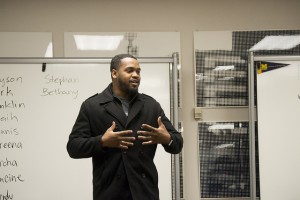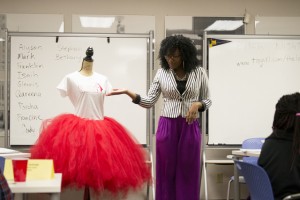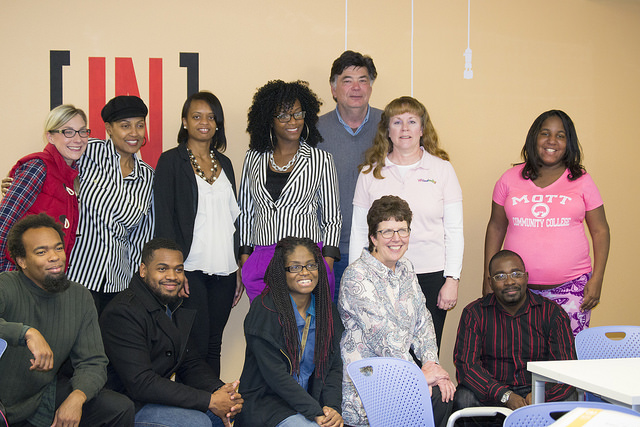Mark Baldwin’s filter that turns rain into drinking water, Stephan McBride’s safe space for gamers to congregate, Porcha Clemons’ Christian dance studio, and Glennis Holcomb’s urban farm business producing pickles and kilts are just some of the interesting and exciting business ideas that participants hope will win them start-up funding at a Grand Rapids pitch competition Nov. 30.
At the final session of Co.Starters, a 9-week business boot camp at UM-Flint’s Innovation Incubator, the cohort of entrepreneurs practiced pitching their big ideas and shared feedback.
Eleven participants gave brief pitches about their new or pre-existing businesses. Several entrepreneurs already sell products out of the Flint Farmers’ Market including Alyson Caverson’s Happy Girl Granola, Franklin Pleasant’s The Local Grocer and Cindy Eckert’s Whimsicality, which sells old fashioned toys. Others are looking to launch or expand their community businesses in the next year including Qareena Clemons’ massage therapy business, Isaih Dawson’s Dawson’s Kitchen and Catering, and Francine Houston’s Writers Inc., a publishing business.
 The program was brought to campus through a partnership with Grand Valley State University’s Sprout Lab, which subsidized some of the costs of the Flint boot camp to make it affordable for local entrepreneurs. The Innovation Incubator was an ideal location because of its convenient free public co-working space downtown and free parking adjacent to the building.
The program was brought to campus through a partnership with Grand Valley State University’s Sprout Lab, which subsidized some of the costs of the Flint boot camp to make it affordable for local entrepreneurs. The Innovation Incubator was an ideal location because of its convenient free public co-working space downtown and free parking adjacent to the building.
Co.Starters participants across the state are automatically eligible for a pitch competition in Grand Rapids on November 30. One of the Flint pitches will receive a special AKT Peerless sponsored prize of $1,000 and could potentially win the competition’s grand prize of $5,000.
AKT Peerless, an environmental remediation and economic development firm, also sponsored the program and provided Garrett Geer, vice president of business development and government relations, to teach the course in Flint.
 Participants enjoyed Geer’s teaching style and appreciated the cohort model, in which participants share feedback and together gain a more complete understanding of the concepts. By the end of the program, the more than 20 students and community members who participated were more confident in themselves and the direction of their ventures.
Participants enjoyed Geer’s teaching style and appreciated the cohort model, in which participants share feedback and together gain a more complete understanding of the concepts. By the end of the program, the more than 20 students and community members who participated were more confident in themselves and the direction of their ventures.
The Innovation Incubator will hold a free pitch clinic in January to prepare entrepreneurs for two other local competitions in early 2016. For more information, visit the Innovation Incubator webpage.
